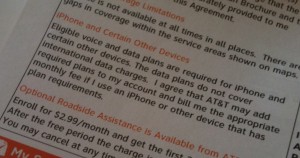
The headlines are all over the blogs: AT&T announced today that they are doing away with “unlimited” data plans and replacing them with limited packages at lower prices. I’m not going to repeat the news – Boy Genius Report has the best overview I’ve seen. Instead, I’m going to explain why I think this is a positive move for everyone involved, including AT&T, the customer, and the US wireless phone industry as a whole. This first post talks about the buffet mentality that got us here.
One Size Fits All?
Americans love all-you-can-eat buffets. It’s not that we can really eat everything in sight, though many non-Americans I’ve met seem to think we can. No, we love the idea that we can eat anything we want without paying a penalty.
A few years back, I talked to the manager of a buffet stocked with prime rib and champagne and asked about the finances of his operation. He laughed and admitted that some customers do indeed consume far more than they pay for. But the majority of his customers eat only a little more than they would if paying a-la carte, and they more than make up for the gluttons. The buffet manager also confided that although many people feel guilty and even apologize for gorging on expensive food and leaving some un-eaten, he rarely hears complaints about the price being too high. His customers say they are getting a deal too good to be true, even as he rakes in the profits.
All-you-can-eat pricing seems like a win-win situation, but it’s also incredibly wasteful and inefficient. It encourages people to over-indulge, to act impulsively, and to ignore the consequences of their actions. They think, “People may be starving somewhere else, but I paid the entry fee so I’m going to try some of everything!” At the same time, economics teaches us that there is no such thing as a free lunch: Buffets wouldn’t exist is they weren’t profitable. Just like the casinos in Las Vegas, buffet restaurants exist because they are able to maximize overall profit even as a few winners beat the system.
The Smartphone Tax

Does this talk of buffets and casinos remind you of your wireless data provider? It should! American wireless companies have converted from the tight competition and slim margins of voice calls to the fat profits that go with data plans. AT&T and Verizon have come to dominate the market, but every company happily feeds the desire for all-you-can-use data.
Buy an iPhone or Droid today and you have a variety of voice plans to choose from, ranging from just $10 for a “family talk” line to over $100 for solo unlimited calling. Plus, offerings like AT&T’s A-List allowed customers to squeeze their talk time even more.
But (until today) smartphone buyers were forced to take the standard data plan: “Unlimited” data for a flat $30 per month. The “data tax” for smartphones is scandalous: AT&T and Verizon didn’t bother to compete here because they had their customers over a barrel. Want an iPhone? You have to pay $30 extra per month for data – and $5 or more for text messaging!
These “unlimited” plans weren’t all they were cracked up to be anyway. See my post about The Dark Side of Unlimited Mobile Phone Plans.
My family recently added an additional iPhone and I was shocked to see that the data rates were not even listed on the paperwork: By signing up, we “agreed” to pay AT&T’s standard data and text messaging fees, whatever they were. Although the salesman promised we could still get the old $20 data and text service since I was re-activating a first-generation iPhone, they couldn’t get it running. So they handed us a 3G iPhone and activated it at $20 instead. Later that day, AT&T unilaterally changed it to a $30 data plan, and there was nothing we could do.
Stephen’s Stance
The sad thing is that regular people don’t really use all that much data. Like buffet patrons, we all want flat-fee unlimited use but don’t come anywhere near breaking the bank. Two of the three iPhones in my family use less than 40 MB of data per month, making the required $30 unlimited plan an egregious expense. Even a power user like me rarely breaks 500 MB in a month, and I regularly stream audio! Although the iPhone is an awesome multimedia device, it’s difficult to use a GB of data in a month on a smartphone.
Should smartphone buyers who don’t use streaming services subsidize those who do? Of course not! I’m cheering about AT&T’s new limited data plans, and I explain more in my next post on the subject.
“All You Can Eat” image by johnsam
Leave a Reply